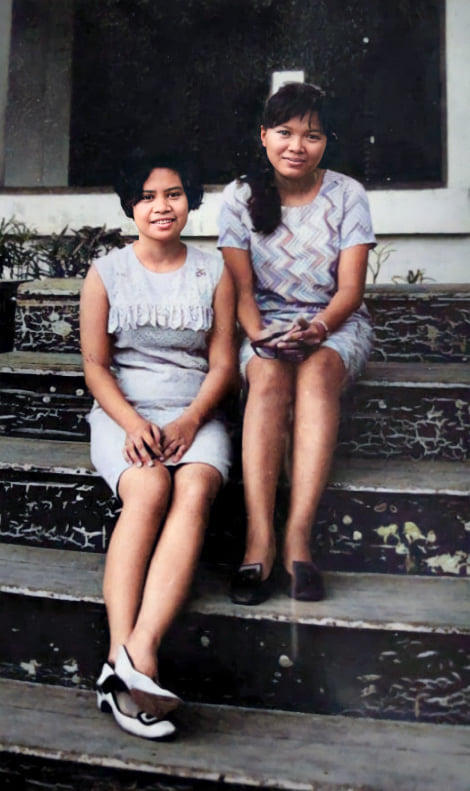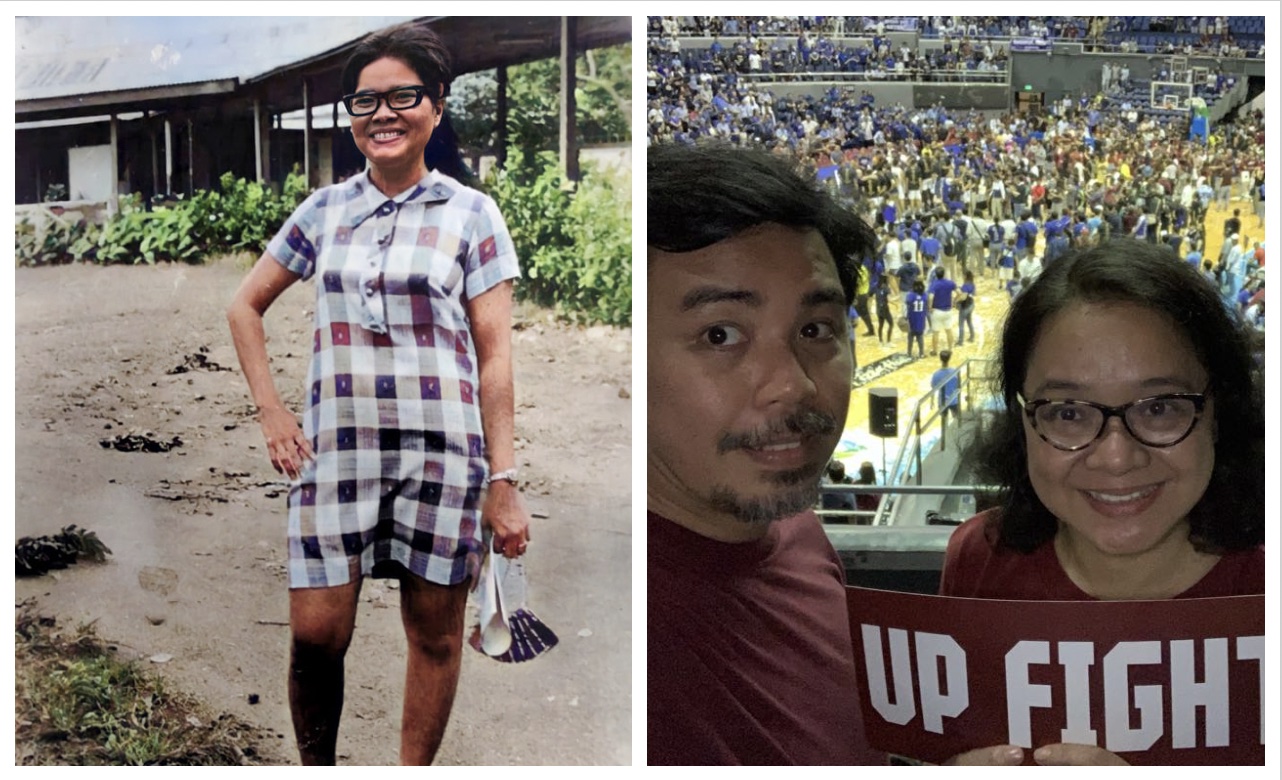Earnest Mangulabnan Zabala, wife of Eraserheads’ Buddy Zabala, has never met her mother before. So it was a special moment of intimacy when she received an unexpected gift from a fan of the iconic band: full-color photos of her late parent.
According to Earnest, a restoration hobbyist named Jeric Benitez sent the full-color photos hours after she posted their black-and-white originals on Facebook. Scanned by an aunt in Australia who keeps the family mementos, Earnest posted the pictures of her mother—formerly a high school teacher—in honor of World Teachers’ Day.
“A couple of hours later, I got a PM from an Eheads fan that included the restored photos. Hobby daw niya ang mgarestore ng old photos,” Earnest, who was Eraserheads’ ex-business manager, told Coconuts. (He said it was his hobby to restore old photos.)
“This here is my mom,” her post began. “October is a very special month for her as she was a teacher and was born on Oct. 8.” Were she still alive, Earnest’s mother would have been 73 by now.
Along with her father, she was also a desaparecido, a word referring to victims of enforced disappearances during Martial Law.
“No, I wasn’t able to greet her a Happy Teacher’s day last Oct. 5. Neither did I have a birthday post for her last Friday. I forgot to do so even though I always tell myself each year that it will be different next year.”
“I never knew my parents. I never knew my mom. They met when they were student activists. I was born in 1972 and they went underground as soon as martial law was proclaimed on Sep. 23. Sila ay mga desaparecidos.” (They are desaparecidos.)
Earnest’s parents met as part of the growing number of college students who openly protested dictator Ferdinand Marcos, and sought to fight the authoritarian regime when the ruthless leader declared martial law. Marcos assumed all governing powers, replaced the Constitution under dubious circumstances, and orchestrated the military to intimidate, harass, jail, and abuse his opponents.
Marcos’ suppression of activism only fermented dissent among youths, many of whom left the city for the countryside to join a growing underground revolutionary movement that sought to topple Marcos’ authoritarian rule.
Those who joined the revolutionary movement knew the possible price of freedom was their lives. With the writ of habeas corpus suspended, authorities made multiple warrantless arrests in the homes of known and suspected dissidents, imprisoning, torturing, and killing them. Amnesty International estimates the following record of human rights violations under the Marcos regime: 70,000 people were imprisoned, 34,000 were tortured, and 3,240 were killed, while 77 disappeared.
At 9 months old, Earnest was separated from her parents and was sent to live up north in Bontoc, Mt. Province with her paternal grandparents.

“I always knew that my parents were different. I don’t think it was ever hidden from me,” Earnest told Coconuts. “And also, maliit na town ang Bontoc and I’m sure naririnig-rinig ko na rin sa mga ibang tao. Ang maalala ko very early on, alam ko na rin na dangerous ang ginawa nila.” (Also, Bontoc is a small town and I’m sure I have heard stories from other people. I remember very early on that I knew what they did was dangerous.)
With hushed whispers and anecdotes came the stigma associated with the underground movement. “Minsan, naririnig ko sa tono ng mga ibang nakakatanda the way they would talk about my Lolo and his son. I don’t remember exactly what was said but I remember the tone.” (Sometimes, I would hear it from the elders’ tone, the way they would talk about my Lolo and his son. I don’t remember exactly what was said but I remember the tone.)
“Like my dad’s decision to go underground was something shameful and of course it reflects on my Lolo.”
Earnest doesn’t recall if she had ever talked about the stories she heard with her grandfather, who died of cancer when she was eight. “May kasabihan sa probinsya na ‘pag half-closed daw ang eyes ng nakaburol, may hinihintay yung departed. My Lolo’s eyes were half-closed.” (There’s a superstition in our town that when the eyes of the departed are half-closed, that means they are waiting for someone. My Lolo’s eyes were half-closed.)

Still, a childhood with her lola and lolo on her father’s side meant she grew up listening to stories about her father. It was her mother, Earnest said, who was a mystery to her.
In 2014, Earnest submitted claims for her parents for the Human Rights Victims Claims Board, which provided reparations to human rights victims under Martial Law and their kin. This enabled her to learn more about the parents she never knew, especially her mother. “When I finally began exploring their lives a little deeper than my usual, my longing and feelings of deep loss centered around her.”
Earnest knew from her aunt that her mother was her grandmother’s golden girl: the smart and sweet one with a talent for writing. “It really broke (my grandmother’s) heart hearing the news that she was gone,” she shared.
It wasn’t until Earnest was in college when she had learned the term desaparecidos, used to describe individuals—mostly activists—who had disappeared during the Marcos regime without a trace. The last anyone from Earnest’s family heard from her parents was in 1977—in September of that year, they received news that authorities discovered her parents’ safe house in the province of Nueva Ecija. “There were frantic trips to various morgues and funeral parlors but they were not able to locate their bodies,” Earnest narrated. “Since then, we never heard from them. There are no gravesites, either.”

Years later, when Earnest and Buddy’s daughter was nine, she was able to recount the truth about what happened to her parents.
The conversation came after their daughter came home from a visit to her grand-aunt. “She was wondering about her grandparents at my aunt’s place. Apparently, she had asked Auntie about them. Auntie felt that I needed to be the one to tell this story and only replied, ‘They went on a trip and they got into an accident and died.'”
“So when she got home, she asked me and we talked about what happened. And thankfully, she already had an introduction into Martial Law in her class by that time.”
For Earnest, seeing her mother in full color brought life to a brave figure in a way that staid, black and white pictures didn’t.
“I really appreciate it. I got misty-eyed seeing her this way.”





Reader Interactions